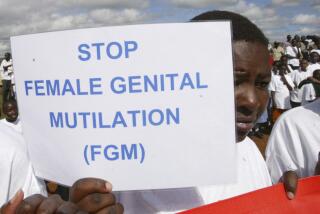Nicaragua abortion ban a violation, rights group says
- Share via
MEXICO CITY — Nicaragua’s total ban on abortion is a violation of human rights and is killing a growing number of women and children, Amnesty International said Monday in launching a campaign to have the measure repealed.
In a report released in Mexico City, the international human rights organization said Nicaragua’s law, which went into effect in late 2006, puts the Central American country among the 3% of the world’s nations that do not allow abortion under any circumstance.
Citing statistics from the Nicaraguan Health Ministry, the report says 33 women and girls died from pregnancy complications in the first 19 weeks of this year, compared with 20 in the same period last year. It also says the real numbers are probably much higher.
Nicaragua has one of Latin America’s highest rates of sexual violence, with the abuse often perpetrated by fathers, uncles or other relatives.
At least 50% of reported rapes are of girls under the age of 18, and most of those who get pregnant are under 15, the report says.
Women and girls who have been impregnated by rapists or whose lives or health is at risk are not allowed to abort.
“A festering, debilitating human rights situation [is] bringing grave fear, threat, harm and even death to Nicaragua’s girl children and women,” Kate Gilmore, executive deputy secretary-general of Amnesty International, said in Mexico City.
Abortion laws are generally restrictive in most of Latin America. The irony in Nicaragua is that the ban was backed by now-President Daniel Ortega, who led the leftist Sandinista revolution 30 years ago and championed women’s rights. In the middle of the 2006 election season, Ortega promoted the law to gain support of the conservative Roman Catholic Church and return to power.
The ban ended a 100-year-old exception that had allowed abortion when the woman’s health was at risk.
Amnesty International issued its 50-page report after an investigation in Nicaragua by Gilmore and a team of experts. She said Ortega refused to see them, and the health minister dismissed their findings of a growing mortality rate among pregnant women as unfounded.
Dr. Leonel Arguello, president of the Nicaraguan Society of General Medicine, said the ban has had a chilling effect on doctors.
“Not being allowed to do everything to save your patient goes against medical ethics,” he said in a telephone interview from Managua, the capital. Fearing they will break the law, many doctors decline to treat pregnant women in obstetric emergencies, or delay treatment, increasing the risks, he said.
The ban initially contained penalties of up to six years in prison for women who had abortions and the doctors who performed them. That was raised to eight years last year. Some advocates wanted sentences of up to 30 years. No one has yet been charged or put on trial.
Though criticized by human rights and women’s groups since it was first drafted, the prohibition received wide support from the church and from several political parties in addition to Ortega’s Sandinistas. A petition supporting the ban collected 300,000 signatures.
Proponents argued at the time that advances in medical science allowed doctors to bring a fetus to the point of viability without endangering the woman’s life and that warnings of heightened dangers were exaggerated.
But Gilmore said lawmakers ignored expert opinion to the contrary.
--
More to Read
Sign up for Essential California
The most important California stories and recommendations in your inbox every morning.
You may occasionally receive promotional content from the Los Angeles Times.











